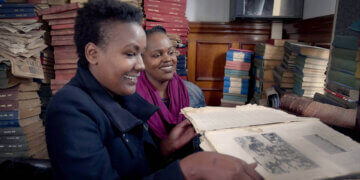Many revolutionaries and leaders throughout history have sported the banner of “the people’s president”, some more deserving than others; an idealistic thought bubble where the voice of the people is believed to be so muffled that their leader fights for their voice, barred from the instruments of power. For Africa, however, this political question to be debated over is the norm twice every decade. In the documentary Bobi Wine: The People’s President, Nat Geo and Ventureland partner up to document the life of Robert Kyagulanyi, commonly known as Bobi Wine, the Ugandan-musician-turned-opposition-politician who voices his people’s anguish and, with it, captures the true scale and complexity of an underdog story, one whose conclusion is a bus drive away.
Beginning with the formative years of Bobi Wine’s life, the documentary taps on the nostalgia of two young kids from polar opposite upbringings to begin the narrative. The flamboyant swagger of a ghetto boy and the reserved innocence of a girl in love. In his youth, Bobi is portrayed as the bouncing, smiling, and accessorised celebrity with promises of a successful music career. Yet even in that time, with the Caribbean-inspired and multilingual delivery of his music, an authentic and clear voice shines through. He chooses to use this voice to call attention to the government of the day.
Purely shot from Bobi’s perspective, Uganda’s sitting president, Yoweri Museveni, barely has three scenes in the forefront. Yet his presence hangs in every scene of this documentary, sometimes literally with posters and billboards menacingly hanging over the frame. Introduced as an incumbent who won’t vacate from rule, Bobi takes the mandate of his new-found parliamentary position to constitutionally force Museveni out. But like the results of every presidential election in Uganda, Museveni wins by a landslide in the parliament. Distraught by the greed of his fellow parliamentarians, Bobi decides to fight directly against the tyranny of Museveni.
Sharing a lot of similarities in structure with Sam Soko’s Softie (about Kenyan human rights activist and “the people’s watchman” Boniface Mwangi), the camera follows Bobi’s anguish and resolve intimately, and the effects his struggle has on those tied to him. Forced to translate their thoughts for the camera and audience, what sounds like broken English becomes intense emotions that can’t be scripted. From a wife crying from the weight of uncertainty to a little girl explaining the cruelty her father is enduring without truly understanding it, Bobi Wine: The People’s President soars higher into Bobi’s influence over the waves of followers chanting to his every word. With the experience of entertainment under his belt, Bobi galvanises a nation through his music and his captivating showmanship, uniting every corner of Uganda under his cause and suffering the consequences dearly.
An expansive documentary both in scope and timeline, the cinematography through the landscape and people of Uganda opens the nation to its rural kinetic roots, at times quietly reverberating through the mundane before turning into a viscerally horrific tale of government malice. Faces, sounds, and homesteads are familiar even here in Kenya, as is the spirit of the people Bobi fights for. The documentary doesn’t hide the darker sides of the nation either, showing without reservation the forceful cruelty and blatant deception of the government. The news bits that have played on Kenya’s screens over the years about the state of democracy in Uganda now, under the collective context of the events on the ground, reveal a struggle that feels all too common yet on a scale that feels fictitious.
The edit is clanky at times, and the first-time direction of Christopher Sharp and journalist Moses Bwayo allows a more raw and grounded aesthetic to the film, an intentional decision to mirror the unfiltered and unprecedented reality our central figure finds himself in. This focus on Bobi for the whole duration of the documentary comes at its own detriment. With the absence of the voices of the government, the other opposition players, and the people of Uganda beyond their association with Bobi, Bobi Wine: The People’s President serves as a periscope into Uganda entirely from Bobi’s eyes. As the film speeds through a decade of tumultuous elections, there is an absence of the man in between these elections. How he relates to his family and constituents when he is not calling them to action, how his voice has shaped the youngest population in the world outside politics, and more importantly, a deeper and more intimate exploration of his psyche and why exactly he is a different option. Not exploring these perspectives feels like a missed opportunity, one that doesn’t negate the clear quality this documentary offers, but one that could have set it apart from documentaries of similar subject matter.
“Museveni could have had the best story Uganda has ever seen.” As Bobi contemplates the similarities he shares with his once revered revolutionary, he questions his own resolve and if he too, once in the seat he so vehemently covets, would let it go. For now, with this documentary and the many documentations of his struggle, Bobi Wine is living the best story Uganda has to offer, one he writes through unwavering courage against an immovable force on the other side. Bobi Wine: The People’s President is a compelling documentary that perfectly captures that.
Enjoyed this article?
To receive the latest updates from Sinema Focus directly to your inbox, subscribe now.











